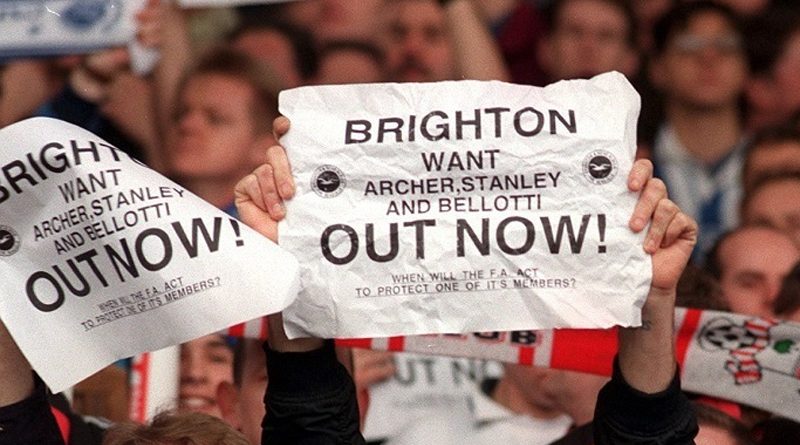Greg Stanley tried to kill the Albion – why should we “regret” his passing?
Former Brighton & Hove Albion chairman Greg Stanley has passed away. Alongside Bill Archer and David Bellotti, Stanley tried to drive the Albion out of business to profit personally from the club’s demise.
Given that Stanley was involved with the club 25 years ago now, there are an entire generation of Albion fans who may never have head of him. After all, he is the lesser mentioned of the trio who did their best to kill our football club and pocket the profits.
For the uninitiated, Stanley bares a huge amount of responsibility for the club’s near-demise in the mid-90s. He was the man who originally brought Archer to the Albion and the two of them very quickly removed the no-profit clause from the club’s articles of association. Former-Albion director John Campbell says in Build a Bonfire that it was Stanley’s signature on the document authorising the change.
The removal of the no-profit clause was ground zero for everything that was to follow. The clause stated that if Brighton went out of business then all the club’s assets must pass to a similar Sussex sporting institution – no individuals were allowed to gain financially.
Archer then sold the Goldstone Ground – something which Stanley again did nothing to prevent. If the club now went under with the no-profit clause removed, Archer and his fellow board members could walk away with the proceeds from the sale swelling their own personal bank accounts once they had driven the Albion into the grave.
What they hadn’t banked on though was Brighton fans discovering their plan and then launching a two year campaign to save the club. In that time, Stanley would turn up to various meetings held by supporters at which he would lie through his teeth to protect Archer. He would pretend to help even though he had no intention of doing so as he simply wanted his share of the profits.
Most of these famous meetings took place at the Concorde Bar. One saw Stanley declare “We will go to Portsmouth over my dead body”, even though he knew that the Goldstone had been sold and the Albion were now homeless – a situation that would last for 14 long years.
There is a brilliant photo from that meeting of John Baine and Paul Samrah looking on in disbelief at the top table as a spew of utter bollocks pours from Stanley’s mouth. Days later and the goalposts were pulled down in the final home game of the 1995-96 season against York City.
Other great Stanley moments included him publicly claiming to have resigned from the board, only for his resignation to never be registered with Companies House. Lies, lies, lies. He was still there, ready and waiting to take his cut when the Albion went under.
The Argus would later reveal that a £600,000 loan from Greg Stanley to Brighton had attracted £381,000 in interest over three years. Paul Samrah calculated that the money which Stanley was set to make outstripped by some distance the amount that even a top Swiss bank would offer in interest rates.
Stanley had arranged to use Brighton as his own personal cash cow on top of the sale of the Goldstone. Bellotti responded by banning The Argus from the ground for daring to besmirch Stanley and the Albion’s names by printing the revelations. Samrah – who had also been the man to discover the removal of the no-profit clause – was also banned.
All of which makes it a little surprising that Brighton announced the death of Greg Stanley “with regret” on the official club website. Even more astounding was that Ray Bloom – Tony Bloom’s uncle and a board member in his own right – appeared to launch a defence of Stanley in a written tribute.
“For those who don’t know, Greg invested a considerable amount of money to help the club stabilise following relegation to the third tier. His investment enabled Barry Lloyd to rebuild the team and win promotion at the first attempt during the 1987/88 season.
“It also paved the way for the club to reach the 1990-91 end-of-season play off final – and it is only right that he is acknowledged for that, regardless of what happened since then.”
“Greg never had any desire to be the chairman of the club or to get involved in the day-to-day running of the Albion. Parts of the story, in terms of what happened subsequently with the sale of the Goldstone, are well known. Other individuals who were involved had very little regard for the club.”
“But now is not the time for that, and it would not be a fair accusation of Greg to say he didn’t care for the club. He was always a warm-hearted, genuine man and one who had the best intentions.”
“Sometimes it was difficult for him to carry out those intentions, for a number of different reasons, but he should be acknowledged for the good things he did for the club.”
Which is rather like a relative of one of Harold Shipman’s victims asking the people of Hyde to remember the good things that Shipman did in the area.
Anything positive that Stanley may have done counts for nothing given the charge sheet against him. After all, Archer’s original investment helped stave off the tax man and other debtors. When he pops his clogs, can we expect a club statement asking supporters to remember that rather than the asset stripping?
Ian Hart was one of those who clashed most with Archer, Bellotti and Stanley during the War Years. He wrote on the North Stand Chat thread about Stanley’s death, “Stanley only ended up at the Albion because Ken Bates saw him as an embarrassment and for all his money didn’t want him on the board at Stamford Bridge.”
“He was a bully, I had my final death threat from him only three years ago, after the Build a Bonfire Night at the Komedia ended up on YouTube.”
“I certainly wasn’t the first person to receive one, but like all bullies he was extremely insecure and unfortunately with his money that made him fair game for people looking to make serious money with his endorsement.”
It seems incredible that Brighton are now trying to alter history by asking fans to remember the good that Stanley is supposed to have done. In fact, they have now spoken more positively in public about Stanley than they have Dick Knight or Gus Poyet in the past five years.
When Bellotti died in 2015, the Albion didn’t even acknowledge his existence. He didn’t deserve a second more of Brighton & Hove Albion’s time, which is how it should have been with Stanley.
Let his family and friends mourn him and let those who had the misfortune to have to deal with him through the Albion – and be threatened by him -remember him in their own way.
There certainly should be no rewriting of history. Will the club now redact all mentions of Stanley in the copies of Build a Bonfire that are on sale in the club shop?
Ray Bloom may have been a friend of Stanley’s, but that doesn’t change the fact that Greg Stanley was one of the three men who came so close to killing Brighton & Hove Albion.
The modern-day Albion cannot airbrush that from history, no matter how hard they try. No regrets here that Stanley is gone.





Greg Stanley also owned FADS home DIY store. He had little respect for customers, when asked what the store concept was he said – pile it high and pretend to sell it cheap he replied that it was the “F*** All Discounts Store”